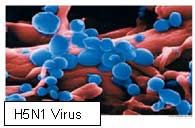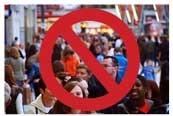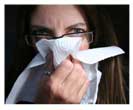Why This is Important

When you go out in public, you expose yourself to the virus. When you return home, you put your family at risk by letting the virus inside. This threat is why it is critical to stay home as much as possible for the duration of a local outbreak.
- High risk occupations (some healthcare professions, for example) need to have decontamination stations at the workplace. Consult your organization for decontamination procedures.
- Lower risk occupations/activities require your good judgment and common sense. The remainder of this section applies to these lower risk occupations/activities.
Minimizing Contamination
1. Minimize the opportunity for contamination by smart behavior. 
Stay home as much as possible. Avoid crowded areas/public gatherings. Wash hands (and arms if necessary) before eating, drinking, smoking, using the telephone, taking medication, applying make-up and inserting contact lenses.

- Cover all new and existing cuts and grazes with waterproof dressings before leaving home.
- Don't touch your face or eyes with your hands or gloves.
- Wash your hands after touching surfaces which could be contaminated.

- Cover coughs and sneezes with a tissue, or cough and sneeze into your upper sleeve.
- Wash your hands or use a hand sanitizer after you cough, sneeze or blow your nose.
- Wear disposable gloves when you leave home, if you will be handling anything. The gloves will need to be disinfected just like your hands would, but they will provide protection for wounds and cuts.
- If practical, use a credit card when shopping. These are easy to disinfect with a bleach solution or Lysol. Use disposable gloves when touching the keypad or signing the charge slip. Put your copy of the receipt in a plastic sandwich bag. If you
 have no disposable gloves, use hand sanitizer immediately after the transaction.
have no disposable gloves, use hand sanitizer immediately after the transaction.
- If using cash, keep this in a separate plastic bag, away from other items. When you return home, you can clean the money with rubbing alcohol, or spray thoroughly with Lysol. Do NOT use bleach water on money.
- For mail, it is easier to handle carefully, rather than try to disinfect. It is best to open mail outside your house, wearing gloves. Before coming inside, dispose of envelopes and unnecessary mail, and spray what you will keep with Lysol.
2. Minimize the opportunity for contamination by disinfection. - Look around your home and disinfect frequently touched surfaces. Don't forget telephones and computer equipment.
- You can use unscented household bleach to make a general disinfecting solution for hard, non-porous surfaces:
NOTE: Electrical items should NOT be rinsed or washed with bleach water. Use Lysol spray or rubbing alcohol when there is no danger of electrocution. If there is a possibility of electrocution, turn off the power, spray with Lysol, and leave the electricity off until the Lysol has dried.

- Create bleach solution using ¾ cup unscented bleach per gallon of water.
- Wash, wipe or rinse items or area with water, then apply solution.
- Let stand 5 minutes.
- Rinse thoroughly and air dry.